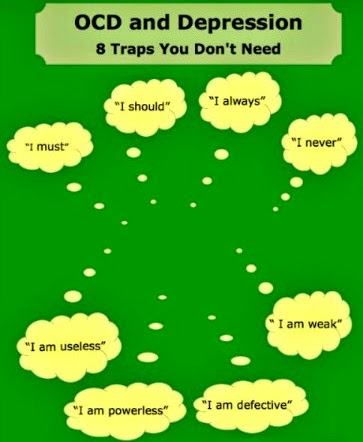Obsessive-compulsive disorder and depression are both mental illnesses. Just by looking at the symptoms of OCD we can say that suffering from a disease of this kind is not easy and poses a significant risk of developing adjacent mental illnesses, like depression.
Constantly having to face feelings of fear, stress and anxiety, an OCD patient can slowly descent into a depression. Only the idea of having repeated and horrifying thoughts inside our minds can make any person, like you and me, feel down and miserable.
Yet alone to have to face these aspects in a daily manner. The mind of an OCD patient is already worked out by the effects of this disease, so depression is in many cases, just around the corner.
The major symptoms of depression
You have to understand that depression is more than a state of sadness or disaffection.
It is normal to have bad days or difficult situations when you feel sad, stressed, demoralized, like the light at the end of the dark tunnel fails to appear. But any healthy person will soon recover and feel better as they find a solution to their problem. Surely you had one of those periods, but now they are all gone.
But when depression gets installed, the symptoms are rather severe. Thus, the patient needs medical attention and particular support to overcome this situation. The state of depression will affect all the usual activities one is unrolling, his family life and his performances at the workplace.
If you have at least four of the following symptoms, which are manifesting for at least two weeks, on an everyday basis, you should ask the help of a doctor:
- Eating disorders, you start eating too much or too less.
- Sleeping disorders, you sleep too much or almost at all.
- You experience feelings of being slowed down or being too excited, the people around you will notice this shift of state.
- You feel drained of your energy.
- You experience feelings of utterly worthless or an intense and unreal guilt.
- Thinking and focusing become a problem.
- You start having thoughts about death or even suicide.
The connection between OCD and depression
Unfortunately, the incidence of OCD patients that will experience a depression episode at least once during their lifetime is rather big. To make an idea about the severity of this situation, you should know that about two-thirds of the OCD sufferers will face depression.
A medical explanation of this phenomenon is that both OCD and depression are in close relationship of the abnormal levels of Serotonin in the brain. The lack in the proper amount of Serotonin is considered to be a cause that triggers both of these mental illnesses.
I.e. they both have a connection with a specific part of the brain that controls the human’s reactions to emotion.
Maybe the worst part of depression in OCD patients is that it interferes with the treatment used for OCD.
The doctor that is prescribing the OCD treatment should always know if you experience any distress, in order to adjust the treatment to face the situation.
In many cases, doctors prefer to treat the depression first, only afterward dealing with OCD. Medical studies showed that depression in OCD patients often evolves as responses to several disturbing obsessions.
So OCD itself is a situation posing depression risks to the people that have to face its issues every day.


